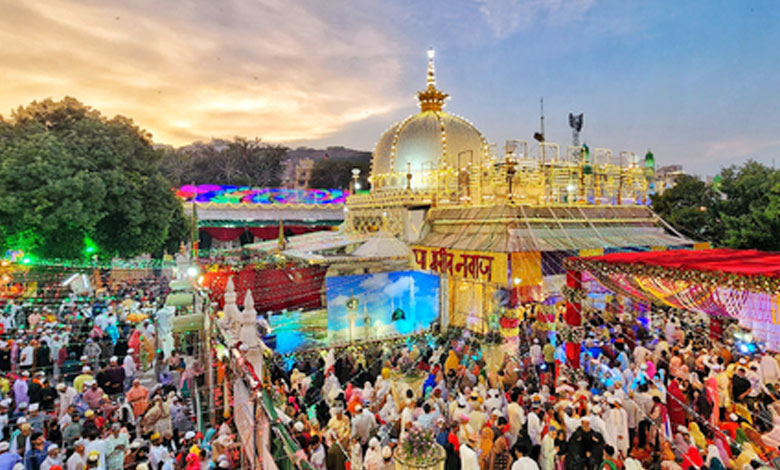Pakistani Pilgrims Present ‘Chadar’ at Ajmer Sharif During 813th Urs of Khwaja Moinuddin Chishti
"Pakistani pilgrims present 'chadar' at Ajmer Sharif during the 813th Urs of Khwaja Moinuddin Chishti, symbolizing devotion and unity between India and Pakistan. Read about the religious visit, security arrangements, and cultural significance."

Ajmer: A group of Pakistani pilgrims arrived in Ajmer on Tuesday morning to present a symbolic ‘chadar’ (holy cloth) at the shrine of Khwaja Moinuddin Hasan Chishti, Garib Nawaz, during the ongoing 813th Urs celebrations.
The annual event attracts thousands of devotees from across the globe, and this year, a special delegation from Pakistan has traveled to Ajmer to participate in the time-honored tradition, marking a significant moment in religious and cultural diplomacy between the two nations.
Table of Contents
Details of the Pakistani Pilgrims’ Visit
On January 6, 2025, a total of 89 Pakistani pilgrims crossed into India through the Wagah Border in Amritsar, Punjab. They traveled by a special train, arriving at Ajmer early on Tuesday morning at 2:56 am.
The group is accompanied by two officials from the Pakistan Embassy, who are overseeing the visit. Upon their arrival, the pilgrims were greeted at the Ajmer Railway Station with warmth and devotion, many of them raising their hands in prayer, expressing gratitude for having reached the sacred city.
As part of their offerings, the pilgrims brought special gifts for the shrine, including famous Pakistani sweets and bouquets, as a mark of reverence. Nearly all members of the group carried a ‘chadar’ to present at the shrine, continuing a long-standing tradition that signifies their devotion to the revered Sufi saint.
Devotional Celebrations and Unity Prayers
The arrival of the Pakistani pilgrims was marked by expressions of goodwill and unity. Some members of the group sang devotional songs, including the popular “Mere Khwaja Piya, Dar Par Bulwa Liya,” as they made their way to the shrine.
Syed Abdul Wahab Qadri, one of the pilgrims, shared his sentiments, saying, “We have come to the land of Khwaja Saheb. May your country prosper.
We will pray at the shrine for unity between India and Pakistan.” Another pilgrim remarked, “Masha Allah, relations between the two countries are very good. We will pray for even better ties.”
This gesture of devotion is not just a religious observance but also a symbol of peaceful coexistence between the two neighboring countries, often highlighting the power of spirituality in bridging divides.
Security Arrangements and Vigilance
Given the high-profile nature of the visit and heightened security concerns, the administration, along with police, the Government Railway Police (GRP), and other security agencies, ensured tight security throughout the pilgrimage.
The pilgrims’ arrival at Ajmer railway station was met with rigorous security checks by CID and GRP teams. Armed soldiers, commandos, and police personnel were stationed across the area to ensure the safety of all involved.
The pilgrims were subsequently escorted to their accommodation, which was arranged at the Central Girls School in Ajmer, under the supervision of local authorities. All transportation to and from the accommodation was done under tight security via buses.
Also Read | Places of Worship Act Tested Again: Ajmer Dargah in Legal Spotlight
A Tradition of Devotion and Diplomacy
Every year, the Pakistani government organizes a lottery to select pilgrims who are permitted to participate in the Ajmer Urs.
The selected list is sent to the Indian government, which finalizes the number of pilgrims allowed to enter India for the occasion. This collaboration reflects the longstanding diplomatic ties between the two nations, as well as the cultural and religious connections that continue to play a significant role in fostering goodwill.
The traditional procession, where the pilgrims present the ‘chadar’ at the shrine, is a highlight of the Urs celebrations. This event continues to be an important symbol of devotion, with participants singing, dancing, and expressing their reverence for Khwaja Moinuddin Chishti.
It also serves as a reminder of the shared cultural heritage between India and Pakistan, rooted in Sufi traditions and the legacy of Khwaja Saheb.
Ajmer Urs: A Hub of Spiritual Unity
The 813th Urs of Khwaja Moinuddin Chishti, Garib Nawaz, is a major religious event in Ajmer, drawing devotees from around the world.
The shrine of Khwaja Chishti is regarded as one of the holiest sites in India, attracting millions of pilgrims each year. The Urs marks the death anniversary of the saint and is celebrated with prayers, offerings, and processions.
For Pakistani pilgrims, this visit is not just about honoring the saint but also a way to strengthen religious ties and promote peace between India and Pakistan. The pilgrimage serves as a platform for both countries to showcase their shared religious and cultural values, transcending political barriers.

